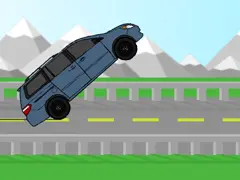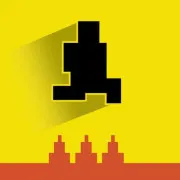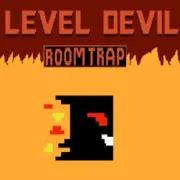Feel the Beat, Surf the Waveform
Keep exploring
Keep the momentum going with more arena racers, action trials, and puzzle standouts.
Escape Drive: Battle-Fueled Racing Mayhem

Play Im Not A Robot in Your Browser

Play Underwheels Online

Jump into Bloxd io in your browser

Wheelie Life Honda Odyssey
Play Egg Dash – A Rhythm Easter Platformer

Jump straight into Untime—no downloads, just play

Dodge traps. Nail the jump. Conquer every gate.

Play in Browser: BLOODMONEY2

Play Level Devil Trap Path Online
Tune your reflexes to the waveform
Ride the line where rhythm meets precision
Geometry Dash Wave strips the experience down to raw timing, clean inputs, and unbroken flow. Your ship arcs upward when you hold and pivots downward when you release, creating a crisp, sawtooth motion that rewards micro-taps and steady rhythm. By focusing on the iconic wave mechanic, Geometry Dash Wave becomes the perfect lab for practicing angles, tempo, and corridor discipline without the distractions of full multi-mode levels. If you want a training ground that translates directly back to the toughest songs and demon routes, Geometry Dash Wave provides it in an instant-play package that runs right in the browser.
Why this focused mode sharpens your skills
The ship’s acceleration curve in Geometry Dash Wave is immediate and readable, meaning every pulse of your finger becomes altitude. That responsiveness makes it ideal for building muscle memory: you’ll learn how long to hold during steep climbs, when to feather a tap to skim a ceiling, and how to commit to a dive without overcorrecting. Obstacles are arranged to echo the beat, so the soundtrack subtly cues your next move. Over time, you’ll internalize not just the patterns on screen but the rhythm behind them, and Geometry Dash Wave turns into a metronome for your reactions.
Beyond rhythm, this mode develops your spatial instincts. Narrow corridors force you to anticipate cornering momentum, while micro-gaps demand calm, almost staccato inputs. The best runs in Geometry Dash Wave happen when your eyes track two or three segments ahead. You’ll feel the line of travel before you reach it, matching the soundtrack’s pulse to the geometry’s intent. Each clean pass confirms that your timing and planning are in sync.
From warm-up to mastery without menu friction
Because it launches instantly, Geometry Dash Wave excels as a warm-up. Two or three quick sessions will wake up your hands, align your focus, and get your rhythm dialed. If you’re preparing for a demanding level in the main series, use Geometry Dash Wave to calibrate your taps and breathing. The format also works for cooldowns: a few relaxed runs after a tough grind can help you lock in progress without the stress of losing a long attempt.
Difficulty tiers scale smoothly. Early tunnels emphasize generous lanes and predictable arcs so beginners can feel the cadence of hold-and-release. As you advance, Geometry Dash Wave introduces tighter angles, quicker tempo shifts, and corridor sequences that compress your margin for error. Practice checkpoints let you isolate a trouble spot and repeat it until your execution is automatic. That repeated exposure turns scary sections into familiar routines, and the next time you meet a similar pattern in a full level, your hands will already know what to do.
Techniques that translate to every tough level
One of the most valuable habits Geometry Dash Wave builds is tap discipline. Think of your inputs as musical notes: long holds for steep climbs, short staccato taps for gentle rises, and deliberate releases to descend. Avoid panic tapping; it’s better to commit to a single confident pulse than to shred the key and lose angle control. Over the course of a session in Geometry Dash Wave, you’ll learn to chain these notes together, turning a hallway of spikes into a phrase you can play on command.
Camera reading is another transferable skill. Instead of staring at the ship, practice soft focus on the path ahead. Spot the next hinge point—the moment you must switch from climbing to diving—and pre-load your finger for that change. Geometry Dash Wave repeatedly presents these hinge points at musical intervals, training your sense of timing as much as your aim. When the soundtrack accents a beat, expect a corridor pivot and prepare the counter-input.
Breathing matters, too. Many failures come from tension, not ignorance. In Geometry Dash Wave, exhale on a long climb, inhale during a descent, and keep your shoulders loose. The steadier your breathing, the steadier your taps. If you feel jittery, take a single slow run with exaggerated, gentle inputs. You’ll often find that the line becomes smoother the moment you ease your grip, and Geometry Dash Wave will reward that relaxation with more consistent arcs.
Turning repetition into real progress
Progress in Geometry Dash Wave is built on feedback loops. After each attempt, ask: Did you late-tap the ceiling? Over-hold the climb? Release too long on the dive? Identify one micro-habit to fix and target it on the next run. Because restarts are instant, you can iterate three or four times in under a minute, compressing hours of learning into a short window. The practice checkpoints shine here; loop a six-second fragment until your hands respond without conscious thought. When that fragment shows up later, your performance will feel effortless, and Geometry Dash Wave will start to feel like second nature.
Mix session goals to avoid plateaus. Spend one day on clean lines—no coin grabs, no risky squeezes, just perfect corridors. The next day, push speed and aggression, threading tighter gaps and attacking faster tempos. On another day, work endurance: sustain steady taps for a long sequence without flinching. Rotating these goals keeps your brain engaged and ensures that Geometry Dash Wave grows every facet of your play.
When to train, when to push for scores
If you’re fresh or returning from a break, use Geometry Dash Wave as a calibrator: two patient warm-up runs to re-find your cadence. Mid-session, target a stubborn pattern from your main levels and mirror it here until it clicks. At the end of a grind, cool down with forgiving tunnels to reinforce good habits while fatigue is high. For score chasers, set micro-challenges—survive a specific corridor without a ceiling scrape, or clear a chain of micro-gaps with only short taps. These micro-goals turn every session of Geometry Dash Wave into concrete progress.
Most importantly, respect your limits. If your lines get erratic, step back for thirty seconds. The sensation of control returns quickly when you reset your rhythm, and Geometry Dash Wave will meet you where you left off. Consistency beats hero runs; the goal is to make hard patterns feel normal.
Your rhythm sandbox, always a tab away
No downloads, no load screens—just press play and move. That convenience makes Geometry Dash Wave easy to fit into a morning routine, a study break, or a pre-stream warm-up. Whether you’re chasing top clears or just want a meditative, beat-guided skill check, the focused design keeps you in the zone. Treat it as a standalone reflex gauntlet or a precise training module; either way, Geometry Dash Wave will tighten your timing, clean your lines, and make the toughest segments in the series feel a little less impossible.
Line up with the beat, trust the waveform, and let the ship sing. With steady hands and clear rhythm, Geometry Dash Wave turns razor corridors into choreography—and every perfect pass feels like surfing a laser through sound.
Feel the Beat, Surf the Waveform is ready to play
Chase perfect rhythm, thread razor corridors, and sharpen reaction time in Geometry Dash Wave. Hold to climb, release to dive, and master pulse-tight ship control.
Share Feel the Beat, Surf the Waveform
Spread the word, invite friends, or bookmark this page to revisit the story whenever you need it.